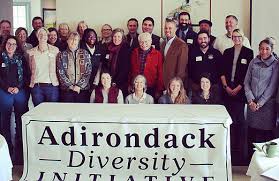Our ability to reach unity in diversity will be the beauty and the test of our civilization. — Mahatma Ghandi
A little over five years ago my wife Erin and I visited the Adirondacks for the very first time. Prior to that we knew very little about the region aside from the Adirondack chairs that we had growing up. While visiting, we did many of the things that some first time visitors do. We hiked Cascade, hiked Baker Mountain, spent a few nights in Lake Placid and Saranac Lake, experienced music, visited art galleries, dined at local restaurants in the evenings and paddled Lake Flower in the mornings.
The folks we encountered were very welcoming to us, encouraged us to move here and helped us build connections that made us feel at home over 1,000 miles away from our families. We felt welcomed, wanted and included. We fell in love with the region and are still in love with it to this day.
But this is just one story. One story of a well-educated white couple and their first experience in the Adirondacks. There are unfortunately, many other stories that don’t fit this narrative. There are other stories and experiences that may turn some people away from this region.
- Aaron Mair, former president of the Sierra Club, faced a racial incident while visiting a favorite Adirondack place
- Alvin Codner was verbally harassed twice while working in the region
- Alice Green experienced isolation while growing up in Port Henry
Changing the Approach. Changing the Narrative.
There are a number of forces working against us in this region that, if left unchecked, could further harm our regional socioeconomic and cultural development. From 2003-2013 the Park’s public school enrollment declined by 21% — twice the rate of communities outside the Park. The Park is also projected to see an overall population decline to 1970s levels by 2030 — a loss of 17,000+ residents. Our region also finds itself ranked as the most tourist-dependent in New York State, with some counties owing nearly 50% of all employment to tourism.
With challenges come opportunities. Since 2014, the Adirondack Diversity Initiative has grown into a coalition of over 30 organizations and businesses working to make the Adirondacks a more welcoming and inclusive community. The initiative aims to tap into the strengths of the region that are vital to maintain for the sustainability of the Park including the following:
- 6,000,000 + visitors annually
- 720,000+ visitors annually from Canada
- 200,000+ seasonal residents
- 130,000+ year-long residents
- 21,000+ employees
- 300+ hotels, motels, inns and cottages
- 100+ villages and towns
- 10 colleges and universities
More Questions Than Answers
The initiative will aim to address many of the questions facing our local communities:
- How can we make our communities more welcoming?
- How can we be more intentional about being inclusive?
- How can we better engage small businesses, educators, public servants and others to ensure regional growth and sustainability?
- What can businesses do better to attract growing tourist segments to the Adirondacks generally, and to their establishments, specifically?
- What can we do to assist our counties — which are some of the poorest in the state?
- What can our villages and towns do better to reverse population decline, while increasing the demand for a younger workforce?
A Welcoming Story for Every Visitor
When it comes down to it, if we want to continue to live, work and play in such beautiful region, it is in all of our best interest to ensure that every visitor’s experience to our region is a positive one. As demographics and travel trends change, it is in all of our best interest to ensure that we do what we can to become a more welcoming and inclusive community.

The Adirondack Diversity Initiative works “toward a more diverse Adirondacks.” ADI learned in March 2019 that the New York State budget will support a full-time coordinator for the program. Read more about the funding in a recent press release from the Adirondack Council, one of over 30 partner organizations and businesses involved the Initiative.
